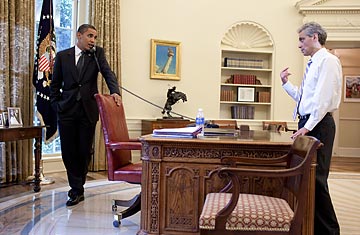
President Obama talks with chief of staff Rahm Emanuel during a phone call in the Oval Office
It was only a few years ago that an up-and-coming member of the House Democratic leadership pointed to a cozy arrangement in the Republican-written Medicare prescription-drug program as a symptom of everything wrong with Washington. The 2003 bill barred the government from negotiating for lower drug prices for its 43 million Medicare recipients. Instead, that task was delegated to private insurers and their agents, who Democrats argued — and still argue — don't have the muscle to get the steep discounts that a huge government program could. "Direct negotiation for lower prescription-drug prices is directly related to our lobbying- and ethics-reform legislation," Rahm Emanuel, then the chairman of the House Democratic Caucus, told the New York Times in January 2007. Both were needed, he said, "to make sure that special interests do not control what happens in Congress." The Medicare bill passed the House but died in the Senate.
Emanuel is now chief of staff in a White House that badly needs the drug industry as an ally in its drive to overhaul the health-care system. And the industry has indeed come through in a big way: in June, at a moment when the Congressional Budget Office was estimating that early versions of two Senate health bills were turning out to be more expensive than expected and would fail to curb rising health-care costs, the industry offered to take an $80 billion hit. Since then, drug companies have been pitching in to mobilize public support for President Obama's drive to reform health care, including collaborating with their onetime adversary, the health-reform-advocacy organization Families USA, to bring back "Harry and Louise," the fictitious couple whose ad campaign did so much to kill a health-care overhaul when the Clintons tried it in 1994. This time, Harry and Louise are arguing in favor of reform.
But the drug industry has also gotten something in return for its support. As reported Thursday, Aug. 6, in the New York Times, the White House agreed privately not to push for anything beyond the $80 billion in savings that the industry promised over the next 10 years. "The President encouraged this approach," deputy chief of staff Jim Messina told the Times. He wanted to bring all the parties to the table to discuss health-insurance reform."
That puts the White House on the other side from House Democrats, who are trying to subject the drug industry to the kind of direct price negotiations with Medicare that Emanuel once championed. The White House also agreed, sources say, not to get behind a provision in the House bill that would eliminate a good deal the industry got from another provision in the Medicare prescription-drug program. The law shifted 6 million eligible beneficiaries from Medicaid — which pays lower prices for drugs — to the Medicare drug plan. In just the first two years of the program, that shift of beneficiaries from one program to the other produced an estimated $3.7 billion windfall for the industry, according to a report last year by the Democratic staff of the House Oversight and Government Reform Committee.
House Democrats are none too pleased by the White House pact with the drug industry. "We were never part of that deal. We are not bound by that deal," says Henry Waxman, chairman of the House Energy and Commerce Committee, one of three panels that wrote the House bill. "It was not particularly a deal I would have made."
It appears that the Senate Finance Committee is planning to go along with the White House–drug industry arrangement. With the White House and Senate siding with the drug industry, the House will face an uphill battle when the two versions reach a conference committee. Still, Waxman vows, "I think what we're doing is the right policy, and I'd rather benefit the seniors than let the drug companies have a big windfall."
The drug lobby argues that an $80 billion commitment is not inconsequential. At least $30 billion will go directly toward discounts that lower the cost of drugs to seniors who get caught in Medicare's infamous gap in coverage known as the "doughnut hole." But the real boost that the drug lobby is giving to the health-reform effort is a political one. Ken Johnson, a spokesman for the Pharmaceutical Research and Manufacturers of America, insists his organization is wholeheartedly behind the idea of comprehensive health reform. And as he puts it, "We are a force to be reckoned with, but we're also a great friend to have on your side."
